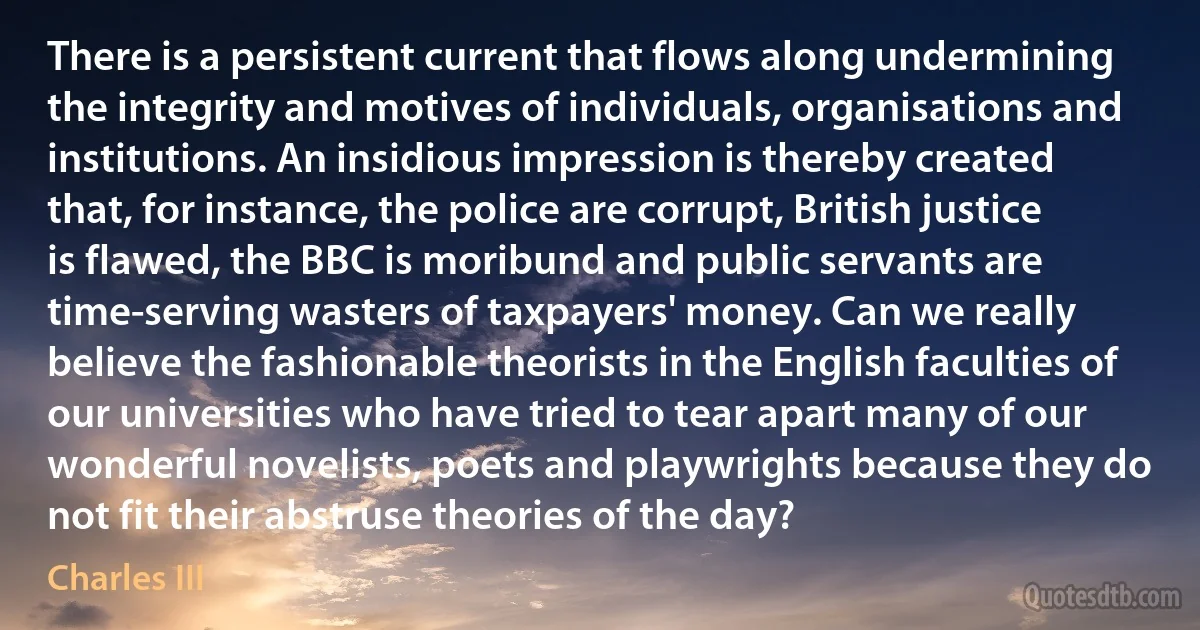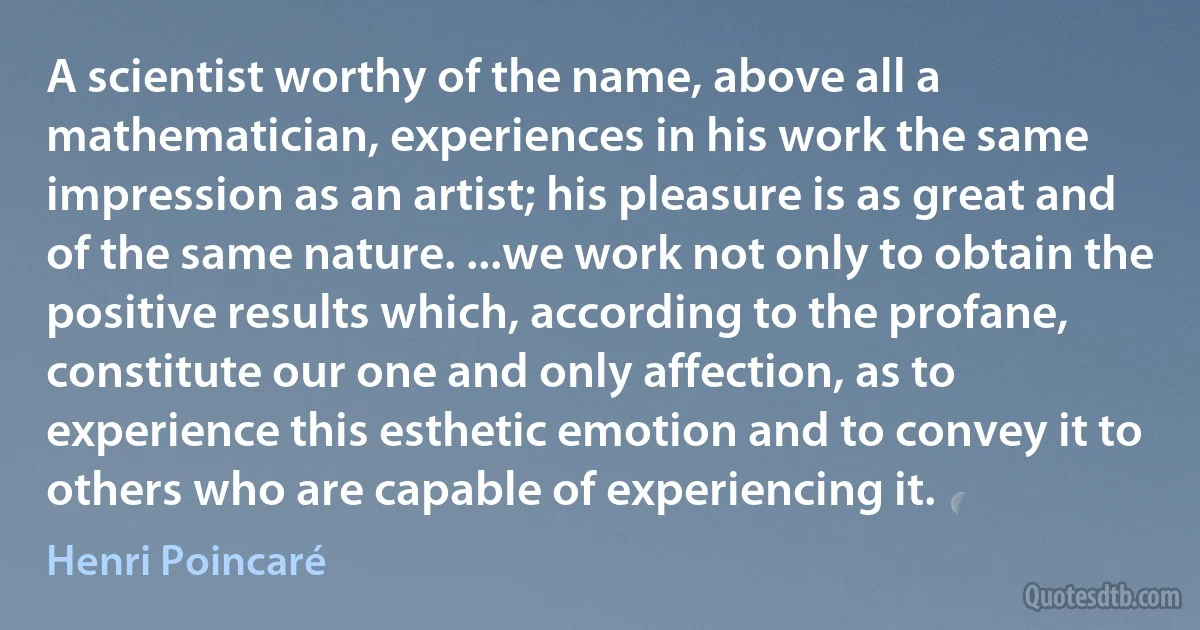Impression Quotes - page 31
But, in my state of mind, this appearance of superiority to illusion added to the effect which Bentham's doctrines produced on me, by heightening the impression of mental power, and the vista of improvement which he did open was sufficiently large and brilliant to light up my life, as well as to give a definite shape to my aspirations.

John Stuart Mill
Explanatory version: Ah Rembrandt, try to paint Cornelis Anslo's voice / What one sees of his appearance is so little of him / What you can't see of him you can learn through hearing. / Those wanting a complete impression of him will have to hear him (preach). (transl. Aernout Hagen, Museum Het Rembrandthuis, Amsterdam)

Rembrandt
When that amusing "Pauli effect" of the overturned vase occurred, on the occasion of the founding of the Jung Institute, I had the immediate and vivid impression that I should "pour out water inside" (- to use the symbolic language that I have acquired from you). Then when the connection between psychology and physics took up a relatively large part of your talk, it became even more clear to me what I was to do. The outcome of all this is the enclosed essay.

Wolfgang Pauli
I do remember my first impressions. It was the same impression I always had of Clemente. He was a very commanding man – commanding in manner of style and appearance. Even in the way he moved, he was commanding. And I was struck immediately with the fact that he had none of the sort of reticence that ballplayers are apt to have when talking to the commissioner – not at all. He spoke to the commissioner and everybody else as equals – that's the way he was. And I don't say that in any sense critically. It was refreshing and it was all done with excellent style. It was his commanding character that I will always remember about him as vividly today, all these years after his death, as at the beginning – commanding of everybody, particularly the ballplayers around him. He was the leader and nobody dared to be performing at less than his best as long as Clemente was looking.

Roberto Clemente
Shaw knows at any moment, on any subject, what he thinks, what you will think, what others have thought, what all this thinking entails; and he takes the most elaborate pains to bring these thoughts to light in a form which is by turns abstract and familiar, conciliatory and aggressive, obvious and inferential, comic and puzzling. In a word, Shaw is perhaps the most consciously conscious mind that has ever thought - certainly the most conscious since Rousseau; which may be why both of them often create the same impression of insincerity amounting to charlatanism.
Yet it is by excess of honesty that Shaw himself lent color to his representation as an inconsequential buffoon bent on monopolizing the spotlight.

Jacques Barzun
The eye - which sees all objects reversed - retains the images for some time. This conclusion is proved by the results; because, the eye having gazed at light retains some impression of it. After looking (at it) there remain in the eye images of intense brightness, that make any less brilliant spot seem dark until the eye has lost the last trace of the impression of the stronger light.

Leonardo da Vinci
На Донбассе гибнут военнослужащие украинской армии. Когда я об этом думаю, на меня это производит очень сильное впечатление. Потому что я считаю, что там все наши
(English: "Ukrainian army soldiers are being killed in Donbas. It's horrible. When I think about this, it makes a very strong impression on me. Because I consider all of them to be ours")

Vladimir Putin
What needs my Shakespear for his honour'd Bones,
The labour of an age in piled Stones,
Or that his hallow'd reliques should be hid
Under a Star-ypointing Pyramid?
Dear son of memory, great heir of Fame,
What need'st thou such weak witnes of thy name?
Thou in our wonder and astonishment
Hast built thy self a live-long Monument.
For whilst to th' shame of slow-endeavouring art,
Thy easie numbers flow, and that each heart
Hath from the leaves of thy unvalu'd Book,
Those Delphick lines with deep impression took,
Then thou our fancy of it self bereaving...

John Milton
There is a misconception of tragedy with which I have been struck in review after review, and in many conversations with writers and readers alike. It is the idea that tragedy is of necessity allied to pessimism. Even the dictionary says nothing more about the word than that it means a story with a sad or unhappy ending. This impression is so firmly fixed that I almost hesitate to claim that in truth tragedy implies more optimism in its author than does comedy, and that its final result ought to be the reinforcement of the onlooker's brightest opinions of the human animal.
For, if it is true to say that in essence the tragic hero is intent upon claiming his whole due as a personality, and if this struggle must be total and without reservation, then it automatically demonstrates the indestructible will of man to achieve his humanity.

Arthur Miller
I am here to argue against the existence of the Christian God. I am not here to defend atheism, contrary to the impression Dr. Craig's talk might have given you. Look, I think there are many ways of thinking about God. And I think some of them are ways I might accept. I just can't accept the Christian God.

Edwin Curley
That immense framework and planking of concepts to which the needy man clings his whole life long in order to preserve himself is nothing but a scaffolding and toy for the most audacious feats of the liberated intellect. And when it smashes this framework to pieces, throws it into confusion, and puts it back together in an ironic fashion, pairing the most alien things and separating the closest, it is demonstrating that it has no need of these makeshifts of indigence and that it will now be guided by intuitions rather than by concepts. There is no regular path which leads from these intuitions into the land of ghostly schemata, the land of abstractions. There exists no word for these intuitions; when man sees them he grows dumb, or else he speaks only in forbidden metaphors and in unheard - of combinations of concepts. He does this so that by shattering and mocking the old conceptual barriers he may at least correspond creatively to the impression of the powerful present intuition.

Friedrich Nietzsche


